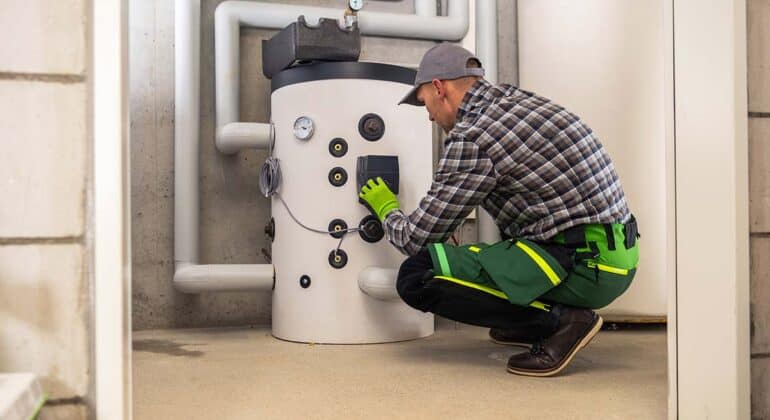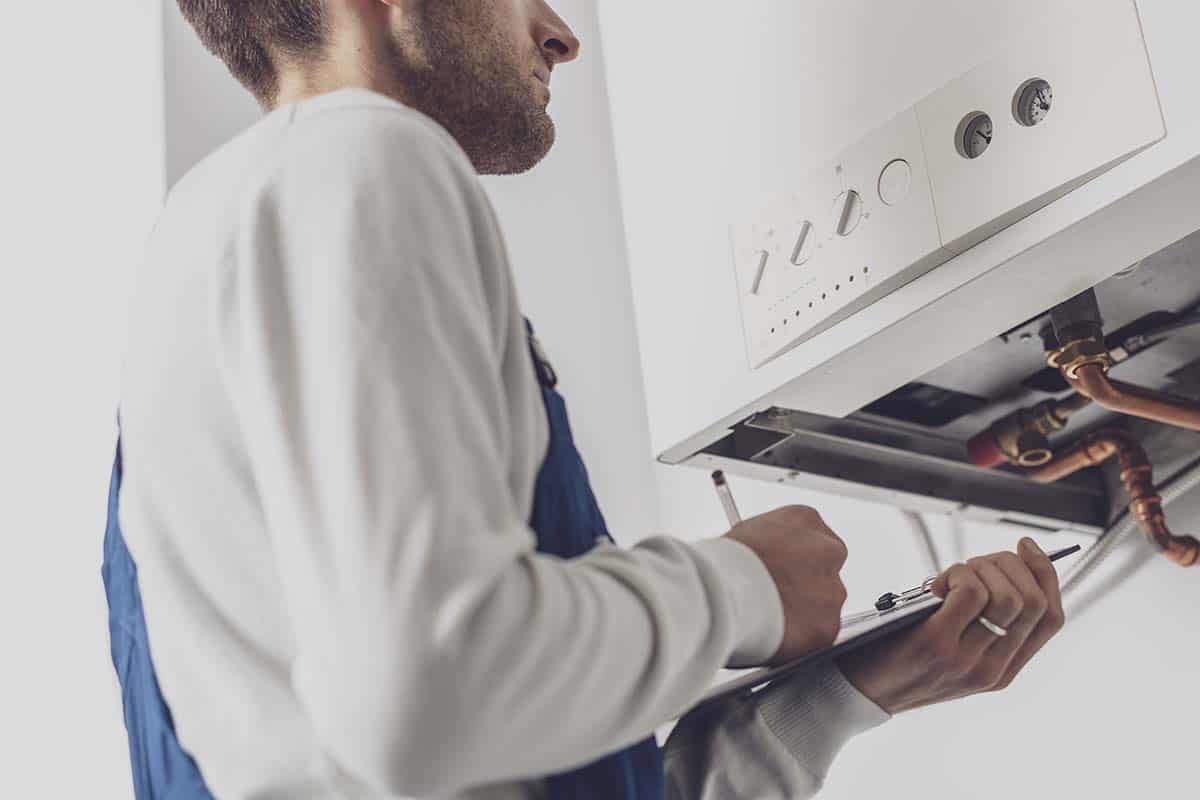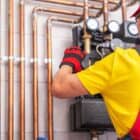Gas boilers are one of the most effective types of central heating systems. They are used in many homes and businesses to provide hot water and warmth during the colder months. However, like all appliances, boilers will eventually need to be replaced after a certain period of time. Knowing when to upgrade your boiler is very important for the safety, efficiency, and reliability of your heating system.
In this article, we’ll talk about how long gas boilers usually last, signs they need replacing, what to think about when getting a new one, and ways to make your boiler last longer.
If you have more questions or you need boiler replacement or boiler repair do not hesitate to contact professional heating engineers.
How long do boilers last?
With regular maintenance and servicing, boilers can endure for up to 15 years or longer in an average household.
How long do gas boilers last?
The average life expectancy of gas boilers is anywhere from 10 to 15 years. However, high-quality boilers that are installed properly and receive regular servicing and maintenance can last up to 20 years.
Investing in a high-efficiency and quality model is always worth it because it will not only reduce your bills but also ensure that you will use the boiler for longer. Gas boilers also require regular maintenance and servicing in order to stay in a good condition for years to come. Having your boiler serviced by a professional at least once a year will also ensure that your home is a safe place.
Factors that affect the life expectancy of a boiler
The factors that can affect the life expectancy of your boiler include the type of the boiler, its usage and maintenance, water quality as well as the quality of the installation.
Boilers come in various types such as gas, oil, and electric, and they typically have varying lifespans. Also, more frequently used boilers tend to wear out faster than those that are used less commonly. The quality of water in your area is another big factor. Hard water may cause mineral buildup and corrosion in a boiler and eventually shorten its lifespan.
Another thing that can have a big impact on the longevity and efficiency of your boiler is the maintenance it receives. Regular professional cleanings and servicing can significantly prolong the life of your boiler. The same is true for the installation process. Your boiler will last longer when it is fitted properly by professionals. A boiler that is installed improperly or with the wrong components may experience premature failure.
When does a boiler need to be replaced?
Here are some signs that may indicate you need to replace your boiler.
- Your boiler is too old. The average lifespan of a boiler is around 10 and 15 years. So if your boiler is approaching or over this age, then it might be time to consider a replacement. Even if the boiler is still working after this time, it is a good idea to think about replacing it with a new, more energy-efficient model.
- You experience frequent boiler breakdowns. The older your boiler is, the more likely it is to break down. Frequent repairs, on the other hand, result in higher costs. Then it might be better to replace your old boiler rather than keep repairing it.
- There is a significant increase in your energy bills. Your boiler may become less efficient over time which will eventually lead to higher energy bills. In such cases, you may want to consider replacing your old and inefficient boiler with a new one.
- The quality of heating and hot water is decreased. Is your home taking longer to heat up? Perhaps your radiators are not heating evenly? If you are experiencing any of these heating problems, it is possible that your boiler is no longer functioning properly. You may need to replace the older boiler with a newer, more efficient model.
- Your boiler is making strange noises. There are many reasons for your boiler to make unusual noises. It could be due to limescale accumulation, a faulty pump, ignition failure and so on. Many times, it is a sign that your boiler is reaching the end of its lifespan so it might be good to get your unit replaced.
- Your boiler is leaking. Leaks and corrosion around the boiler may indicate serious damage which is often expensive to repair. In such cases, it might be better to consider getting a replacement.
- You are concerned about the safety of your boiler. If you have any concerns about your boiler safety, be sure to contact gas safe engineer immediately. There is a great chance that you will need to get a new boiler installed.
If you are experiencing any of the signs above, be sure to consult with a boiler engineer to determine whether you need to replace your boiler.
What factors to consider when replacing a boiler?
A boiler replacement is often a big investment. There are numerous factors that you should take into consideration in order to choose the best boiler for your home or business. Here are some tips and recommendations that may help you.
- Choose a boiler with a higher efficiency rating. When buying a new boiler it might be better to choose one with a higher efficiency rating such as an a-rated boiler. Although energy-efficient boilers tend to be more expensive than less efficient ones (such as G-rated boilers), they will actually help you save money in the long rung. They are designed to use less fuel to heat homes which results in lower energy bills.
- Determine the heat load. Heat load is the amount of heat needed to keep your property warm. There are a few factors that should be taken into account when determining the heat load including the size of your home, the number of windows, the level of insulation, as well as your local climate. A professional heating engineer can assist you in calculating your heat load.
- Choose the right size and capacity. The size of your new boiler will depend on the size of your property. It shouldn’t be too small because it will not provide enough heat for your home. And vice versa, if it is too big it will waste energy. So it is really important to choose the right size boiler. For this purpose, it is best to seek help from a specialist.
- Choose the fuel type. Boilers can be powered by a variety of fuels, including natural gas, oil, propane, and electricity. The fuel you select will be determined by availability in your area as well as your personal preferences. Mains gas is the most common fuel type in the UK. A gas boiler provides a constant supply, and it is considered the cleanest type of nonrenewable energy.
- Compare the features of different types of boilers. There are many different types of boilers available in the UK each with its own unique features. You can usually choose between conventional boilers, combi boilers, system boilers or electric boilers. The best type of boiler for your home will depend on the size of your property, your hot water and heating requirements, your personal preferences and of course your budget. A qualified heating engineer or installer can help you choose the best option for you.
- Consider the cost. Replacing a boiler can be costly, and you should consider both the initial cost and the long-term savings from increased efficiency. You should also consider the cost of the boiler installation and whether any changes to your home’s heating system will be needed.
- Consult with a professional boiler installer. If you want to choose the most appropriate replacement boiler for you, it is best to seek professional advice from a qualified heating engineer. They can help you in determining the right size and type of boiler for your home and make recommendations based on your specific needs and budget.
How to extend your boiler life expectancy?
The best way to prolong the life of your current boiler is to make sure that it is maintained regularly by a professional and serviced at least once a year. Neglecting boiler maintenance can lead to more serious problems, reducing the lifespan of your boiler.
Regular boiler maintenance will keep it running smoothly and prevent breakdowns. The professionals will check your boiler’s water pressure, bleed your radiators, and inspect the radiator valves and condensate pipe. If necessary, they can perform a power flush of your system, clean the internal components of your boiler, and ensure that it is properly ventilated. The technicians can also provide recommendations and advice on future maintenance or repairs required to keep the boiler running properly. This will help to extend the life of your boiler and reduce the need for costly repairs or replacements.
It is also critical to have your boiler serviced at least once a year. This will help in identifying any potential problems with your boiler before they become more serious issues. A typical annual boiler service includes a visual inspection, combustion analysis, cleaning of the main components, a safety check, boiler testing, and maintenance recommendations. Having your boiler serviced once a year can help you avoid costly breakdowns as well as help your boiler last longer.
Frequently asked questions
How much does a new boiler installation cost in the UK?
The cost of a new boiler installation in the United Kingdom can vary greatly depending on a variety of factors, including the type and size of the boiler, the complexity of the installation, and the location of the property.
As a rough guide, a basic gas boiler installation may cost anywhere from £1500 to £3000. If you opt for a more advanced system with additional features such as a high-efficiency condensing boiler or smart controls then you may need to pay up to £4000. If you want to get a more accurate estimate then it is best to contact a heating engineer.
How long do Vaillant boilers last?
Vaillant boilers are well-known for their quality and durability. They can last up to 15 years on average. However, with proper maintenance and care, some Vaillant boilers can last up to 20 years or more. It is important to note that factors such as the quality of the installation, the type of fuel used, and the level of usage can all have an impact on the lifespan of the boiler.
Vaillant boilers come with a warranty that typically lasts 2-5 years. Vaillant also provides extended warranties for some of their boilers, which can provide up to ten years of additional coverage.
To ensure the longevity of a Vaillant boiler, have it serviced on a regular basis by a qualified technician and use high-quality fuel. Proper care and maintenance can help to prevent breakdowns and extend the life of the boiler.
How long do Worcester Bosch boilers last?
The lifespan of a Worcester boiler can vary depending on factors such as usage, maintenance, and the model of the boiler. In general, a well-maintained Worcester boiler can last between 12 and 15 years or more. Worcester boilers come with a warranty that typically covers the boiler for 2-10 years, depending on the model and type of installation. Worcester also offers extended warranties for some of their boilers, which can provide additional coverage for up to 12 years.
How long do combi boilers last?
You can expect your new combi boiler to last anywhere between 10 and 15 years. Some modern boilers can last over 15 years if maintained regularly. The factors that may affect the lifespan of the boiler include the quality of the installation, the type of fuel used, and the level of usage. Regular maintenance and annual services can help to prevent breakdowns and extend the life of the boiler.
How long do commercial boilers last?
The average lifespan of commercial boilers is around 15 to 25 years. They are typically larger and more durable than residential boilers. These boilers are built to last longer and withstand heavy usage in commercial settings. With proper maintenance and care, some commercial boilers should last up to 25 years.
How long do Ideal boilers last?
Ideal boilers can last around 15 years or longer, depending on the model, the level of usage and maintenance. They usually come with a warranty which may provide coverage for 2-10 years, depending on the model and type of installation. Ideal also offers extended warranties on some of their boilers, which can provide up to 12 years of additional coverage.
How long do Potterton boilers last?
Potterton boilers are designed to run efficiently for over 15 years. They are known to be reliable with the majority of models having a high energy efficiency rating. However, it is important that you get your boiler serviced regularly to ensure its longevity and efficiency.
How long do Baxi boilers last?
If you take good care of your new Baxi boiler and keep it maintained as recommended by the manufacturer, you can expect it to last you ten to fifteen years.
How long do electric boilers last?
Electric boilers may last between 15 and 25 years, depending on the quality of the boiler. These boilers typically do not require as much maintenance as gas boilers. However, it is recommended that you get an annual check-up to ensure your boiler is working reliably and safely.
How long do Glow Worm boilers last?
Glow-worm boilers can heat your home for up to 10-15 years after installation if checked and maintained on a regular basis by an approved engineer.
If you need any assistance with installing, replacing, or upgrading any type of boiler in London, our team of expert heating engineers is here to help. Contact us today to schedule a consultation and learn more about our services. We’re committed to providing you with top-quality solutions to ensure your home or business is warm, safe, and comfortable. Don’t wait until it’s too late, reach out to us now and let us help you with all of your boiler needs!




